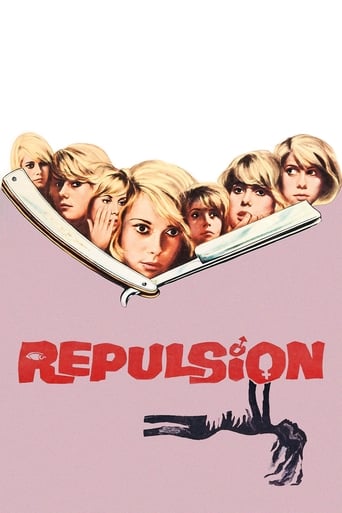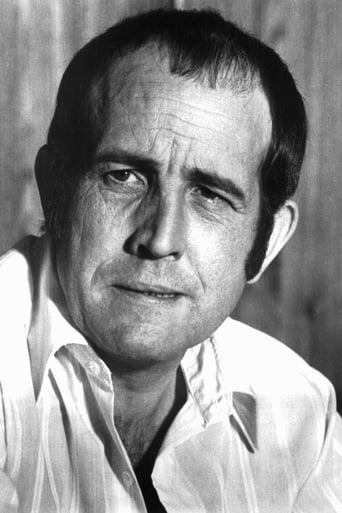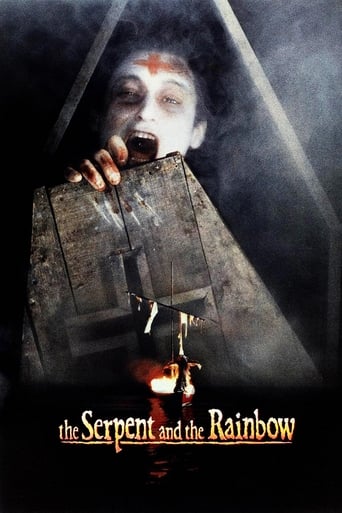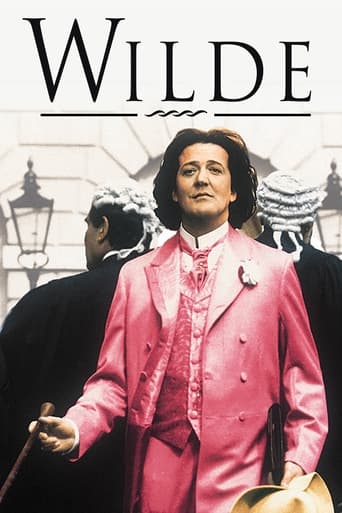Repulsion (1965)
Beautiful young manicurist Carole suffers from androphobia (the pathological fear of interaction with men). When her sister and roommate, Helen, leaves their London flat to go on an Italian holiday with her married boyfriend, Carole withdraws into her apartment. She begins to experience frightful hallucinations, her fear gradually mutating into madness.
Watch Trailer
Cast


Similar titles
Reviews
Ok why good ,the film explores why this woman detests men ,this becomes apparent as the film progresses,and reveals its self in the conclusion ok why bad because polanski had sex with a 13 year old girl ,after filming this
I understand that some people enjoy hidden meanings and "art" films, but learn how to combine an entertaining plot with your hidden message, much like Kubrick did with 'The Shining'. That is, if you want to make a truly good film that reaches people on different levels and different interests. Repulsion is just so aimless and uninteresting. It's as drab and boring as the black and white. Yeah, it was shot well. Yeah, the acting works, but you have no plot to follow other than your own. You take nothing away from this movie other than speculation and uncertainty.
The flat that the very shy, retiring Carol, lives in with her self-assured and "sexually active" sister, is a rather ugly flat, but it least it is neat and clean. However when Carol's sister goes on a little holiday with her boyfriend, and Carol is left alone, Carol imagines hands coming through the walls to grope her and also makes a horrid mess in the apartment. Now it is a very MESSY flat as well as a rather ugly flat. No conflict, no story, just Carol being afraid of everything and making a mess. Her only attempt at straightening out the mess involves ironing a shirt - using an electric iron without plugging it in. Really, she makes a horrifying mess of the apartment. Carol's sister comes home and is duly horrified by the mess. Tedious.
Carol Ledoux is a young Belgian manicurist living in a flat in London with her older sister Helen and Helen's boyfriend Michael. (I note that some reviewers have tried to alter the two women's names to the more authentically Francophone "Carole" and "Helene", but "Carol" and "Helen" are the spellings which we see in the credits and written down in the film itself). The film tells how Carol kills two men, a young admirer named Colin and Helen's sexually predatory landlord. The title "Repulsion" refers to the repulsion Carol feels towards human sexuality, something shown by her reaction to the noise of Helen and Michael's love-making, a reaction that is far closer to disgust than to embarrassment or annoyance. Carol is obviously mentally disturbed, something shown by her demeanour, walking around in a seemingly catatonic state and hardly ever speaking to anyone.This was Roman Polanski's first English-language film and his second feature film following the Polish-language "Knife in the Water" from 1962. It has generally enjoyed a high reputation among Polanski devotees, but it has never been a film which I have been able to warm to, even though, technically, it is a good one. It is a psychological horror film influenced by the work of Alfred Hitchcock, especially "Psycho", and the use of black-and-white photography at a time when colour was becoming the norm may reflect this influence. (The use of a single-word title may also have been homage to Hitchcock; a lot of his films ("Saboteur", "Suspicion", "Notorious", etc.) only have one word in the title. Polanski and his cinematographer Gilbert Taylor are able to create a powerful sense of isolation and claustrophobia and there is a particularly frightening dream sequence.The problem with the film is that there is no character with whom the audience can identify or sympathise. In "Psycho"- a brilliant piece of film-making- Hitchcock is able to make us sympathise not only with his heroine, Marion Crane, and the other murder victims but also, to some extent, with their killer, Norman Bates, who is the victim of his own disturbed mind. Polanski is not able to pull off the same trick. Carol may be mentally ill, but that does not mean that the two killings can simply be seen as the acts of a deranged mind. Indeed, they might even be seen as justifiable homicide in self-defence.This is particularly true of the landlord, whom Carol kills while he is trying to rape her. Colin may not be a rapist, but there is nevertheless something creepy about him. He becomes obsessed with Carol, whom he hardly knows, and when she rebuffs his advances he breaks into the flat to protest his adoration for her, obviously frightening her severely. We cannot therefore really sympathise with Carol's victims, the one a would-be rapist, the other an obsessive creep.So can we sympathise with Carol herself? We certainly could if we understood the cause of her psychological traumas, as we do with Norman Bates, but we don't. It has been suggested that she may have been sexually abused as a child by her father or another male relative, but there is no direct mention of this in the film itself. The only piece of evidence comes in the very last shot of the film, which shows an old family photograph including Carol as a child, looking at an adult male with what has been described as a "look of loathing". On the other hand, it might be a look of "Oh God, Daddy's making me pose for one of these stupid family photos, and I just don't want to!" Catherine Deneuve's performance is, again, a technically good one, at least as far as Carol's outward demeanour is concerned, but we never get much sense of her inner life- or even that she actually has an inner life. Carol seems so dead to the world that we never understand why Colin has fallen for her so heavily, even though Deneuve was of course strikingly attractive. "Repulsion" may be a film which engages the head, but it is never going to appeal to the heart. 5/10

















